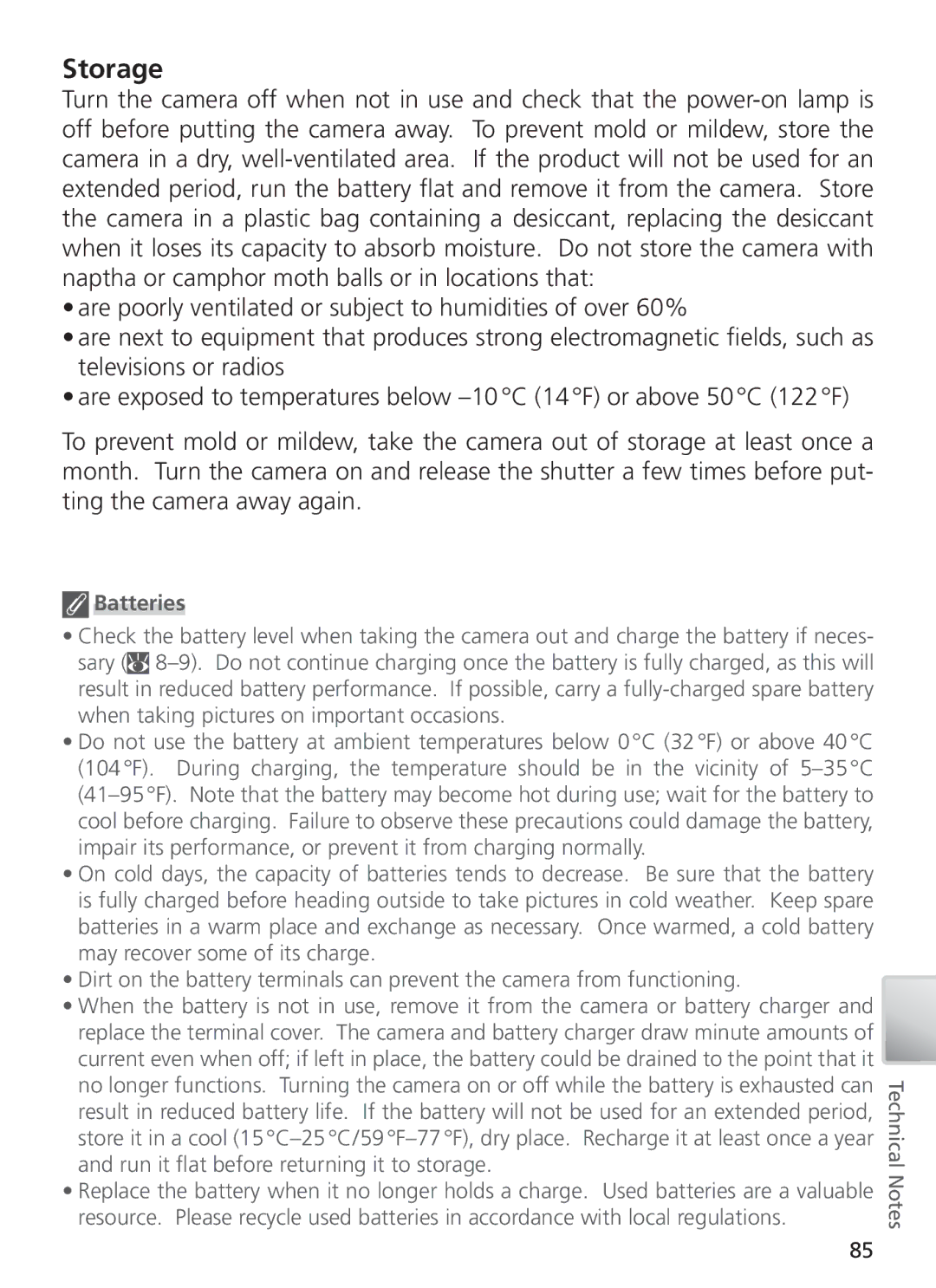Digital Camera
Important Read Before Use
Water Resistance
Memory Cards
Do not disassemble
For Your Safety
Iii
Modifications
Comply with copyright notices
Table of Contents
Menu Guide
Use Only Nikon Brand Electronic Accessories
Before Taking Important Pictures
Introduction
Movie
Simple point-and-shoot mode in which
Majority of settings are controlled by
Parts of the Camera
Shooting
Multi selector
Menu navigation Move cursor
Monitor
9999 /9999
Shooting mode
Removing the Camera from the Cool
MV-12 COOL-STATION
EH-63 AC Adapter
If the Camera Is Wet
Inserting the Battery
First Steps
Charging the Battery
Charging the Battery
EH-63 AC Adapter
Removing the Battery from the Camera
Description
EN-EL8 Batteries
Inserting Memory Cards
To insert a memory card Confirm that the power-on lamp is off
Removing Memory Cards
Insert the memory card
Formatting Memory Cards
Turning the Camera On
Basic Setup
Battery exhausted
Auto Power off Stand-by Mode
Camera Clock
Do Not Touch the Lens
Display Description
Select Mode
Basic Photography
Ready the camera Hold the camera steadily in both hands
When the camera is zoomed in to maximum
Close the Multi-Connector Cover
Frame the Picture
During Recording
Focus and Shoot
Focus
Take the picture
To return to shooting mode, press the button again
View the Results
Press the button Picture will be displayed in the monitor
View additional pictures
Following flash modes are available
Using the Flash
How it works When to use it
More on Photography
Dust or Mist
When Lighting Is Poor
Default Flash Mode
Camera Shake Icon
Taking Pictures with the Self-Timer
Macro Close-up Mode
Easy Close-ups Macro Close-up Mode
Other Options
Scene Mode
Scene Mode
Help
Framing Assist , , ,
Using the Guides
Portrait Assist
Off †
Landscape Assist
Auto
Focus, Exposure, and White Balance
Sports Assist
Night Portrait Assist
Tions are noted on the pages that follow
Other Scenes
To select a scene from the scene menu
20, or macro close-up
Noise Reduction
Preserves the deep hues seen in sunsets and sunrises
Auto Off
Slow shutter speeds are used to produce stunning night
Off Use tripod
Close up
Panorama Assist
Create a digital audio recording
Highlight Panorama assist
Taking Pictures for a Panorama
Voice Recordings
Voice Recordings
Making a Voice Recording
Making a Voice Recording
Deleting Voice Recordings
Playing Voice Recordings
Control Description
Highlight Selected files
Copying Voice Recordings
To choose the type of movie that will be recorded
Movie Mode
Movies
Single AF
Following options are available for Auto-focus mode
Default
Option
Recording Movies
Recording Movies
Recording Time-Lapse Movies
Highlight Set interval time
AE Lock
Use a Reliable Power Source
Deleting Movies
Playback Volume
Viewing Movies
Control
Viewing Pictures
More on Playback
Viewing Pictures on the Camera
Viewing Multiple Pictures Thumbnail Playback
Cropped Copies
Taking a Closer Look Playback Zoom
Lighting
Enhancing Contrast D-Lighting
Voice Memos
Voice Memos Recording and Playback
Voice memo can be recorded and appended to any
Viewing Pictures on TV
Viewing Pictures on TV
Viewing Pictures on a Computer
Before Connecting the Camera Choosing a USB Option
Camera setup menu. After consulting the follow
Highlight PTP or Mass storage
Connecting the USB Cable
Transferring Pictures from Internal Memory
Transferring Pictures
During Transfer
Windows 98 Second Edition SE
Disconnecting the Camera
Drag the untitled camera volume no Name into the Trash
Windows Millennium Edition Me
Highlight Print selected
Printing Pictures
Print Set
Pictures can be printed by any of the following methods
Print-Order Icon
Print Set and Digital Print Order Format Dpof
Print Set
Thumbnail Display
Printing Via Direct USB Connection
PictBridge
Printing Pictures One at a Time
Printing Multiple Pictures
Printing Pictures
Option Description
Highlighted in the thumbnail list, press the center
Multi selector. The menu shown at right will be
Light an option
5x7, Postcard, 100mmx150mm
Printing Multiple Pictures
Dpof printing
Prints
Dpof Printing
Exp. +
Menu Guide
Shooting Menu
Shooting menu contains the following options
Size
Image Mode
Image Mode
White Balance
Preset White Balance
White Balance
Memory Buffer
Restrictions on Camera Settings
Exposure Compensation
Continuous
Interval Timer Photography
Interval Timer Photography
Restrictions on BSS
Best Shot Selector BSS
Off
Highlight BSS picture
Color Options
Sensitivity
Color Options
Sensitivity
Print set
Playback Menu
Playback menu contains the following options
To display the playback menu
Selecting Multiple Pictures
Loop
Slide Show
Slide Shows
Delete menu contains the following options
Delete
Protect
Restrictions on Auto Transfer
Transfer Marking
Select images Mark selected pictures for transfer
Small Picture
Small Picture
To copy a picture at a smaller size
Copy
Copy
All
Shooting menu
Setup Menu
Setup menu contains the following options
To display the setup menu
Small Pictures and Cropped Copies
Welcome Screen
Welcome Screen
Date
To switch between home and travel destination time zones
Date
Time Zone
GMT + Location
Time Zones
Control monitor brightness
Monitor Settings
Turn indicators in the monitor on or off
Brightness
Date Imprint
Date Imprint
Date Counter
Button
Sound Settings
Blur Warning
Which pictures may be blurred. Select Yes to record
Format
Auto Off
Format Memory
Format Card
AF Assist
Reset all
Language
Interface
Firmware Version
Menus
USB cable
Battery
Technical Notes
AC adapter
Caring for the Camera
Avoid contact with liquid crystal
Cleaning
Batteries
Storage
Problem
Error Messages
Be Saved
Display Problem
Transfer
Problem Solution
Troubleshooting
Night landscape, or Dusk/Dawn as appropriate to
Picture has been cropped to below 320 × Picture is a movie
Appendix Focus Lock, File Storage, and Date Imprint
Identifier Extension
Image mode
MB memory card
Original Copy Audio file Type
Date imprint Print set Date
File Storage Image File and Folder Names
Number
Effective pixels
Lens
Focal length
Dimensions
Self-timer
Power sources
Battery life
EH-63 AC Adapter
EN-EL8 Rechargeable Li-ion Battery
Index
Video mode, 45, 80 Vivid color, 64 Voice memo
6MA09011

 Batteries
Batteries![]()
